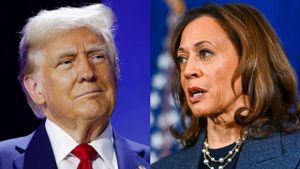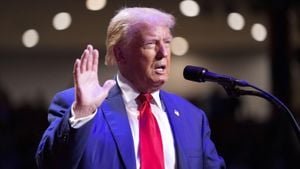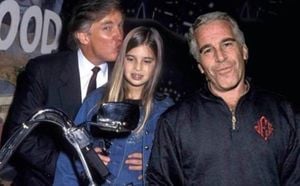With election season heating up, the FBI is sounding alarm bells over the increase of misinformation spreading through social media, particularly focusing on fake videos and false claims about the integrity of the electoral process. On November 5, the agency warned the public about two viral videos masquerading as legitimate notices from the FBI. These videos not only distorted the agency's capabilities but also made sweeping claims about potential terror threats and voter fraud.
The FBI made it clear on Tuesday, stating, "Attempts to deceive the public with false content about FBI threat assessments and activities aim to undermine our democratic process and erode trust in the electoral system." The fake content is causing concern as voters head to the polls, potentially undermining public confidence in the electoral process.
One of the misleading videos advised voters to "vote remotely" due to alleged terror threats, which experts are quick to dismiss. The FBI confirmed there are currently no credible threats based on any intelligence updates. Another fabricated video featured a false press release claiming five prisons across battleground states—Pennsylvania, Georgia, and Arizona—were colluding to rig votes.
These incidents aren't isolated; they come on the heels of broader security agencies warning about heightened foreign interference tactics expected to proliferate around Election Day. The FBI, along with other intelligence agencies, has flagged Russia and Iran as significant players attempting to influence American voters through spread of disinformation.
Recent patterns show influential public figures also contributing to the chaos. Just days before the election, billionaire Elon Musk shared another misleading video on social media, which portrayed purported voting anomalies involving Haitian immigrants. Critics have noted how these fabrications pose risk to not only voter confidence but also the integrity of democratic procedures as misinformation spreads like wildfire.
The challenge of misinformation isn't novel but escalates as voters prepare to make their voices heard, particularly with the significant percentage of people utilizing social media as their primary news source. Voter suppression acts are already suspected, as seen with the recent attempts to dismiss peaceful polling behaviors through negativity fueled by fabricated narratives.
On the ground, the atmosphere is tense. While laws have been put forth to protect the electoral process, uncertainty lingers as the ripple effect from these fake videos could lead some individuals to behave rashly. The FBI has been bolstering its collaboration with state and local law enforcement to protect communities and to maintain public trust, marking election integrity as one of its highest priorities.
Alarmingly, researchers from groups focused on tracking disinformation, such as Antibot4Navalny, believe many of these fake clips are products of organized operations, likely initiated by Russian groups familiar with the art of deception. Their strategy seems to be deconstructing the trust of American citizens, pulling them away from credible news sources and planting doubt about legitimate reports.
The FBI's declaration serves as not just protection but also as encouragement for voters to arm themselves against misinformation. They stress the importance of receiving updates and information from recognized news outlets instead of rumors shared on social platforms where anything can be taken out of the original message's content.
While systems are underway to control proliferation of these disinformation campaigns, the challenge is ever-present. To tackle election misinformation, increased vigilance is needed from government agencies, tech companies, and everyday citizens alike. Shine light on suspicious content, verify sources before sharing—and most of all, encourage one another to vote confidently.
A slew of high-profile incidents like fake bomb threats have linked foreign actors, particularly from Russia, to election interference efforts this year. A recent event saw several polling places forced to close as precautionary measures due to apparent bomb threats, again leading officials to investigate ties to external influence. These events underline the need for vigilance and proactive measures.
Election workers are on heightened alert as polls close, anticipating potential unrest fueled by misleading narratives rampant across social media. With intelligence agencies predicting increased attempts to disrupt the electoral procedure post-Election Day, it will be imperative for law enforcement to remain engaged and prepared to manage any instabilities arising from the fallout of misinformation.
Overall, the integrity and security of the electoral process are at stake as voters navigate through manipulated content and deceptive narratives. With heightened awareness and cautious media consumption, Americans can strive to protect their voting rights and uphold the democratic process during this tumultuous election year.



